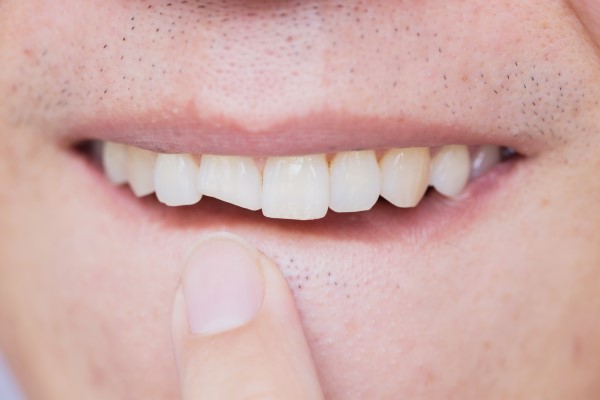Prevent Further Damage of a Chipped Tooth

A chipped tooth is not always a serious dental condition unless the damage reaches the pulp chamber. However, that does not mean it is okay to ignore a chipped tooth simply because it is not causing pain. The most likely part of a tooth to be affected by a chip is the outer layer known as enamel, but that is also the part that protects the rest of the tooth.
The loss of enamel leaves the more sensitive inner layers of a tooth without its natural protection from acids and bacteria. As a result, the tooth is more vulnerable to tooth decay and gum disease. To make matters worse, the tooth might become infected if it is left untreated. Regardless of how minor the damage to a tooth is, it is best to have a dentist evaluate the injury and determine the best way to treat it.
Protecting a chipped tooth from further damage
The best way to prevent a chipped tooth from turning into a bigger oral problem is by getting it checked out by a dentist. Dentists have treatments at their disposal that can be used to fix any aesthetic issues caused by the damage and to prevent further damage from occurring.
Standard treatments used to treat chipped teeth
Composite bonding: This is one of the more affordable treatments performed by dentists. It involves applying a moldable composite to the patient's teeth and rebuilding it. Composites are made from mixtures of plastics and glass. They can be color-matched with the patient's teeth to ensure that any repairs look natural in the mouth. The application of composite resin is a reversible treatment, so patients can still explore other options down the road. The application of composite resin on a damaged tooth typically takes less than an hour for each tooth being treated.
Crowns: These are one of the most commonly used restorations by dentists and are a great way to protect a chipped tooth. The crown covers the part of the tooth that is visible above the gums and protects it from bite forces, bacteria and acids. Crowns are designed to look like real teeth, making it virtually impossible to tell when a person has a crown on one of their teeth. Fitting a tooth with a crown requires the dentist to remove enamel from all four sides. This leads to a better fit with the crown. It is an irreversible process, so the tooth will always need a crown to protect it moving forward.
Veneers: These restorations are only used when the damage affects strictly the front part of the tooth. Veneers serve as masks that hide flaws, and they protect that area from acids and bacteria.
Protect your chipped tooth
Drop by our Coral Gables clinic, or give us a call to learn more about how we can protect your chipped tooth from further damage.
Request an appointment here: https://www.bushdidsmiles.com or call Bushdid Smiles at (305) 740-1443 for an appointment in our Coral Gables office.
Check out what others are saying about our dental services on Yelp: What Should I Do If I Chip My Tooth in Coral Gables, FL.
Recent Posts
When a tooth needs to be restored, a dental crown is usually a great option. Restoring a tooth to good form involves the preparation of the tooth for the placement of the crown. Getting a crown is usually recommended because it can help restore your tooth to its normal shape, function, and look. Read on…
There are several treatment options available for patients with sleep apnea. For some, CPAP machines may be an ideal solution, although more patients are using dental appliances in place of their CPAP machines. The following is a review of available treatment options for sleep apnea and how to choose the one that works best. Two common…
Invisalign® has quickly become one of the most preferred ways to undergo orthodontic treatment, especially for teenagers and adults. Invisalign® offers benefits that cannot be achieved with other treatment methods, which is why general dentists are recommending it as a preferred method. Continue reading to find out more.Below is a quick overview of Invisalign® and why…
A kid friendly dentist has the knowledge and training to make every appointment a good one for young patients. There is no question that dental visits are not the most exciting event for a child. There can be much fear and anxiety with these trips, especially for restorative work such as cavity fillings. As a…


